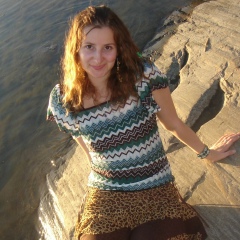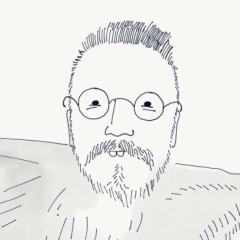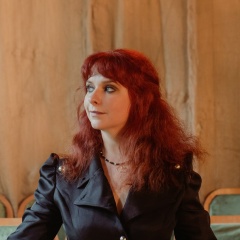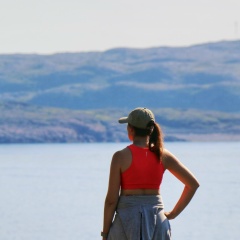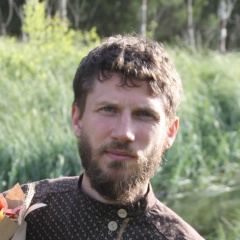Сегодня я решила, что белая образованная женщина может позволить себе не надевать "паранджу", если она этого не хочет???????? на удивление, все прошло гладко, ни одного брошенного камня, только спина слегка заплеванна???????? шутка. На самом деле, местноe население, хоть и приверженцы очень строгой веры, к нам, туристам отнеслись весьма лояльно????
А между тем, мы начинаем долгий 3-х дневный путь домой. Вы все еще приезжаете в аэропорт на такси? Но это же так скучно!
Мы едем в аэропорт на тук-туке, здесь это называется "беча"- приваренная к мотоциклу коляска из остатков старой арматуры и металлических труб.
Ветер в лицо, рев (или стон?) двигателя старого мотоцикла, козы переходящие дорогу, снующие между машинами, улыбчивый водитель - я хочу запомнить этот город таким....
Однако, еще недавно здесь все было иначе. Несколько лет назад город накрыла 18-метровая волна и смыла его с лица Земли - цунами 2004 года унесло жизни 170 тысяч индонезийцев. Фанатичность их веры легко объяснима теперь- главная мечеть одна из немногих построек, выстоявших тогда. Ее белые стены возвышались над руинами разрушенного города. Выжившие люди шли в мечеть, как в единственное здание с сохранившимися стенами и потолком. У каждого взрослого жителя здесь- своя история спасения, но мы не встречали ни одного, кого трагедия обошла бы стороной. Большинство из них потеряли семьи тогда.
Сейчас город полностью восстановлен, здесь самые лучшие дороги на всей Суматре, новые дома. Индонезии помогали другие страны.
Покидая эту страну уже во второй раз, я поняла одно: за две поездки из 17.5 тысяч ее островов мы посмотрели только 5, и каждый из них не похож на другие.
В центре Суматры живут Батаки. В наши дни - христиане, но еще 100 лет назад они практиковали каннибализм. Сейчас их вкусовые пристрастия несколько изменились, но внешний вид до сих пор оставляет желать лучшего - они жуют кору какого-то неведомого мне дерева, чтобы окрасить зубы в красный цвет. Ты едешь им на встречу, а они улыбаются тебе кровавой улыбкой.
На Севере - правоверные мусульмане.
На острове Вех, где мы провели последние 3 дня - сбежавшие от проблем европейцы. Они создали здесь семьи, воспитывают детей-метисов, никуда не спешат и очень счастливы.
Остров Ява-центр образования и культуры Индонезии.
Острова Гили -идеальны для укурков, там можно все, и тебе ничего за это не будет.
На Бали вообще живут буддисты-пофигисты.
Огромная самобытная разнообразная страна, и мы о ней еще так мало знаем...
А между тем, мы начинаем долгий 3-х дневный путь домой. Вы все еще приезжаете в аэропорт на такси? Но это же так скучно!
Мы едем в аэропорт на тук-туке, здесь это называется "беча"- приваренная к мотоциклу коляска из остатков старой арматуры и металлических труб.
Ветер в лицо, рев (или стон?) двигателя старого мотоцикла, козы переходящие дорогу, снующие между машинами, улыбчивый водитель - я хочу запомнить этот город таким....
Однако, еще недавно здесь все было иначе. Несколько лет назад город накрыла 18-метровая волна и смыла его с лица Земли - цунами 2004 года унесло жизни 170 тысяч индонезийцев. Фанатичность их веры легко объяснима теперь- главная мечеть одна из немногих построек, выстоявших тогда. Ее белые стены возвышались над руинами разрушенного города. Выжившие люди шли в мечеть, как в единственное здание с сохранившимися стенами и потолком. У каждого взрослого жителя здесь- своя история спасения, но мы не встречали ни одного, кого трагедия обошла бы стороной. Большинство из них потеряли семьи тогда.
Сейчас город полностью восстановлен, здесь самые лучшие дороги на всей Суматре, новые дома. Индонезии помогали другие страны.
Покидая эту страну уже во второй раз, я поняла одно: за две поездки из 17.5 тысяч ее островов мы посмотрели только 5, и каждый из них не похож на другие.
В центре Суматры живут Батаки. В наши дни - христиане, но еще 100 лет назад они практиковали каннибализм. Сейчас их вкусовые пристрастия несколько изменились, но внешний вид до сих пор оставляет желать лучшего - они жуют кору какого-то неведомого мне дерева, чтобы окрасить зубы в красный цвет. Ты едешь им на встречу, а они улыбаются тебе кровавой улыбкой.
На Севере - правоверные мусульмане.
На острове Вех, где мы провели последние 3 дня - сбежавшие от проблем европейцы. Они создали здесь семьи, воспитывают детей-метисов, никуда не спешат и очень счастливы.
Остров Ява-центр образования и культуры Индонезии.
Острова Гили -идеальны для укурков, там можно все, и тебе ничего за это не будет.
На Бали вообще живут буддисты-пофигисты.
Огромная самобытная разнообразная страна, и мы о ней еще так мало знаем...
Today I decided that a white, educated woman can afford not to wear a “veil” if she does not want this ???????? surprisingly, everything went smoothly, not a single stone was thrown, only the back was slightly spattered ???????? joke. In fact, the local population, although adherents of a very strict faith, treated us very loyally to tourists, ????
Meanwhile, we begin a long 3 day journey home. Are you still coming to the airport by taxi? But it's so boring!
We are going to the airport in a tuk-tuk, here it is called “Becha” - a stroller welded to the motorcycle from the remnants of old fittings and metal pipes.
The wind in the face, the roar (or moan?) Of the engine of an old motorcycle, goats crossing the road, scurrying about between cars, smiling driver - I want to remember this city like this ....
However, recently everything was different here. A few years ago, the city covered the 18-meter wave and washed it off the face of the earth - the tsunami of 2004 claimed the lives of 170 thousand Indonesians. The fanaticism of their faith is easily explained now; the main mosque is one of the few buildings that survived then. Its white walls towered over the ruins of the ruined city. The surviving people went to the mosque, as in the only building with preserved walls and ceiling. Every adult resident here has his own story of salvation, but we have not met anyone whom the tragedy would bypass. Most of them lost families then.
Now the city is fully restored, there are the best roads all over Sumatra, new homes. Indonesia helped other countries.
Leaving this country for the second time, I realized one thing: for two trips out of 17.5 thousand of its islands, we saw only 5, and each of them is not like the others.
In the center of Sumatra live Batak. These days, they are Christians, but 100 years ago they practiced cannibalism. Now their taste preferences have changed somewhat, but the appearance still leaves much to be desired - they are chewing the bark of some unknown tree to me to turn the teeth red. You go to meet them, and they smile at you with a bloody smile.
In the North - the faithful Muslims.
On the island of Milestone, where we spent the last 3 days - the Europeans who escaped from problems. They have created families here, raising children of mestizos, are not in a hurry and are very happy.
The island of Java is the center of education and culture of Indonesia.
The Gili Islands are perfect for an ukuk, everything is possible there, and nothing will happen to you.
In Bali, there are generally Buddhist nihilists.
A huge original diverse country, and we still know so little about it ...
Meanwhile, we begin a long 3 day journey home. Are you still coming to the airport by taxi? But it's so boring!
We are going to the airport in a tuk-tuk, here it is called “Becha” - a stroller welded to the motorcycle from the remnants of old fittings and metal pipes.
The wind in the face, the roar (or moan?) Of the engine of an old motorcycle, goats crossing the road, scurrying about between cars, smiling driver - I want to remember this city like this ....
However, recently everything was different here. A few years ago, the city covered the 18-meter wave and washed it off the face of the earth - the tsunami of 2004 claimed the lives of 170 thousand Indonesians. The fanaticism of their faith is easily explained now; the main mosque is one of the few buildings that survived then. Its white walls towered over the ruins of the ruined city. The surviving people went to the mosque, as in the only building with preserved walls and ceiling. Every adult resident here has his own story of salvation, but we have not met anyone whom the tragedy would bypass. Most of them lost families then.
Now the city is fully restored, there are the best roads all over Sumatra, new homes. Indonesia helped other countries.
Leaving this country for the second time, I realized one thing: for two trips out of 17.5 thousand of its islands, we saw only 5, and each of them is not like the others.
In the center of Sumatra live Batak. These days, they are Christians, but 100 years ago they practiced cannibalism. Now their taste preferences have changed somewhat, but the appearance still leaves much to be desired - they are chewing the bark of some unknown tree to me to turn the teeth red. You go to meet them, and they smile at you with a bloody smile.
In the North - the faithful Muslims.
On the island of Milestone, where we spent the last 3 days - the Europeans who escaped from problems. They have created families here, raising children of mestizos, are not in a hurry and are very happy.
The island of Java is the center of education and culture of Indonesia.
The Gili Islands are perfect for an ukuk, everything is possible there, and nothing will happen to you.
In Bali, there are generally Buddhist nihilists.
A huge original diverse country, and we still know so little about it ...





У записи 35 лайков,
0 репостов.
0 репостов.
Эту запись оставил(а) на своей стене Ирина Мешалкина











